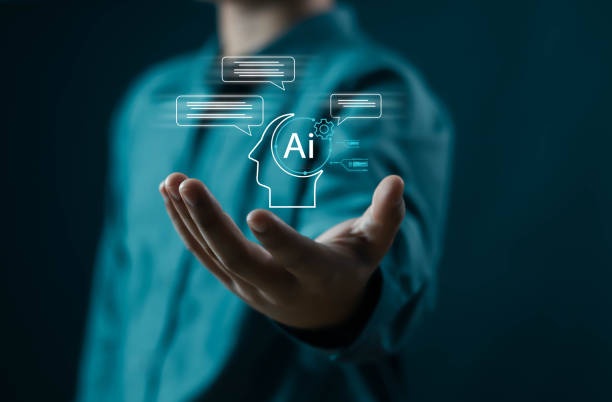- +91-8923999074
- sales@efoxtechnologies.com
Blogs
- Home
- Blogs
How AI is Revolutionizing Search Engine Optimization: The Future of SEO
Search Engine Optimization (SEO) has always been a dynamic field, constantly evolving with search engine algorithm updates, user behavior changes, and technological advancements. In recent years, Artificial Intelligence (AI) has become a game-changer, revolutionizing SEO in ways never seen before. From content creation to search ranking algorithms, AI is shaping the future of how websites get discovered online.
In this blog, well explore how AI is transforming SEO, the AI-powered tools leading this change, and the strategies you need to adopt to stay ahead in the digital marketing game.
1. AI-Powered Search Algorithms: Google’s Evolution

Google has been using AI to refine its search algorithms for years. With updates like RankBrain, BERT, and MUM, AI now plays a crucial role in understanding user intent and delivering more relevant search results.
?? RankBrain (2015)
RankBrain was Googles first AI-powered algorithm update. It helped process search queries by understanding the relationships between words and predicting user intent, making search results more accurate.
?? BERT (2019)
Bidirectional Encoder Representations from Transformers (BERT) improved Google’s ability to understand natural language processing (NLP). This means Google can now comprehend the context of a query rather than just individual keywords.
?? MUM (2021-Present)
The Multitask Unified Model (MUM) is even more powerful. It can process multiple forms of content, including text, images, and videos, in 75+ languages to provide deeper insights for complex queries.
What This Means for SEO
Traditional keyword stuffing no longer works.
Content must be high-quality, informative, and structured for user intent.
Websites that provide contextually relevant content rank higher.
2. AI and Content Creation: Smarter, Faster, and More Engaging
AI-powered writing tools like ChatGPT, Jasper, and Copy.ai are changing how content is created. These tools can:
? Generate SEO-friendly content.
? Provide keyword suggestions.
? Optimize meta descriptions and headings.
Should You Use AI for Content Writing?
While AI can assist with content creation, Googles Helpful Content Update favors human-centered, well-researched content. The best strategy? Use AI for assistance but always add a human touch to ensure originality and engagement.
3. AI-Driven Keyword Research and Search Intent Analysis

AI tools like Semrush, Ahrefs, Surfer SEO, and Clearscope are revolutionizing keyword research.
?? Semantic Keyword Analysis – AI now understands search intent rather than just focusing on exact-match keywords.
?? Predictive SEO – AI-driven tools analyze user behavior and predict upcoming trends in search queries.
?? Topic Clusters & NLP – AI groups related keywords into topic clusters to improve content structure and ranking potential.
What This Means for SEO
Focus on long-tail, intent-based keywords rather than just short-tail ones.
Use AI tools to discover new content opportunities.
Create content around topics rather than single keywords.
4. Voice Search and AI Assistants: The Rise of Conversational SEO
Voice search is exploding with AI-powered assistants like Google Assistant, Siri, and Alexa. More users are searching with conversational, question-based queries rather than short keywords.
?? 58% of consumers use voice search to find local business information.
?? By 2025, half of all online searches will be voice-based.
How to Optimize for AI-Powered Voice Search
Use natural language and question-based phrases in content.
Optimize for "near me" searches to enhance local SEO.
Create FAQ sections on websites with conversational, AI-friendly answers.
5. AI in Technical SEO: Automation and Site Optimization
Technical SEO has traditionally been time-consuming, but AI tools can now automate most of the process.
? AI-Generated Sitemaps – AI tools optimize XML sitemaps for better crawling and indexing.
? Automated SEO Audits – Tools like Screaming Frog and Google’s PageSpeed Insights analyze websites in real time.
? AI-Powered Schema Markup – AI helps structure content for rich snippets and featured snippets in search results.
What This Means for SEO
AI makes technical SEO faster and more precise.
Websites must be well-structured, fast, and mobile-friendly.
Structured data markup (Schema) is essential for AI-driven search ranking.
6. Personalized Search and AI in User Experience (UX)
Google now personalizes search results based on user behavior, location, and search history. AI helps tailor experiences, making it harder for websites to rank universally.
How to Optimize for AI-Driven Personalization
Improve user engagement metrics like click-through rate (CTR) and dwell time.
Create dynamic content tailored to different audience segments.
Implement AI chatbots for real-time engagement and better conversion rates.
7. The Future of AI in SEO: What’s Next?
As AI continues to advance, SEO will evolve in the following ways:
?? AI-Generated Visual Search – Google Lens is making image-based SEO more important.
?? AI-Powered Video Search – Google and YouTube AI now analyze video content for search rankings.
?? Fully Automated SEO Strategies – AI-driven tools will handle real-time ranking optimizations.
Will AI Replace SEO?
? No, but it will reshape it. AI can enhance SEO strategies, but human creativity, intent-driven content, and ethical optimization will still be essential.
Final Thoughts: How to Stay Ahead in AI-Powered SEO
?? Use AI to automate repetitive SEO tasks but focus on human creativity.
?? Optimize for intent, not just keywords to align with Google’s AI algorithms.
?? Embrace AI-powered tools like Surfer SEO, Jasper, and Semrush for research and automation.
?? Prepare for voice and visual search, as AI assistants continue to grow.
AI is not replacing SEO—its reshaping it. The businesses that adapt to AI-powered SEO will dominate search rankings in the coming years.
What’s Next?
How are you leveraging AI in your SEO strategy? Let us know in the comments! ??